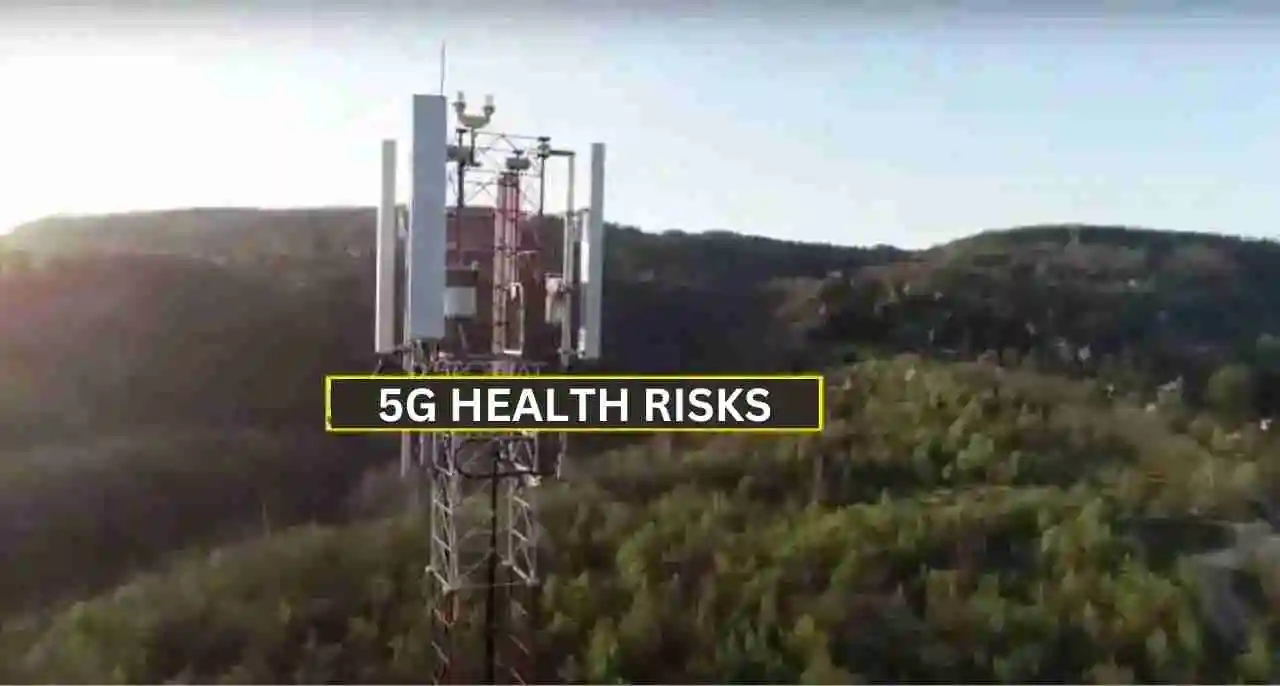Have you ever wondered if your smartphone is slowly killing you? I know I have. Ever since I heard about the launch of 5G in India, I have been bombarded with messages and articles warning me about the dangers of this new technology. Some say it can cause cancer, brain damage, infertility, and even COVID-19! But how true are these claims? And should we be worried about our health and safety?
In this blog post, I will explore the facts and myths about 5g health risks and their impact on our health. I will explain what 5G is, how it works, and why it is different from previous generations of cellular networks. I will also examine the scientific evidence and the opinions of experts on the potential health risks of 5G. By the end of this post, you will have a better understanding of 5G and its benefits and challenges, and you will be able to make an informed decision about using it.
Table of Contents

5G Health Risks: Don’t Get Zapped in 2024:
One of the most common questions people ask about 5G is: Is it safe? To answer this question, we need to understand what 5G is and how it works. 5G is the fifth generation of wireless technology, and it promises to deliver faster and more reliable data than ever before. You can think of 5G as a wireless symphony, where different instruments (frequencies) play together to create a harmonious sound (data).
Or you can imagine 5G as a data highway, where more lanes (bandwidth) allow more cars (devices) to travel at higher speeds (data rates).
But not all frequencies are the same. 5G uses higher frequencies than previous generations, like 4G, which means it can carry more data but also has a shorter range. This is why 5G requires more cell towers, or base stations, to cover the same area. Some people worry that these cell towers emit harmful radiation that can cause health problems, especially cancer. However, this is a misconception.
5G uses non-ionizing radiation, which means it does not have enough energy to break the bonds of molecules or damage DNA. This is different from ionizing radiation, such as X-rays, which can cause mutations and cancer. Non-ionizing radiation is everywhere in our environment, from sunlight to radio waves, and it has been proven to be safe by numerous studies and experts.

The Cancer Conundrum: Separating Science from Scare Tactics
One of the biggest fears people have about 5g health risks is that it can cause cancer. But is there any truth to this claim? Or is it just a scare tactic used by some groups to oppose 5G? To answer this question, we need to look at the existing research on 5G and cancer, and see what the experts say.
There have been several studies conducted on 5g health risks and cancer, both in India and abroad. Some of these studies have found no evidence of 5G health risks, while others have reported some effects on cells or animals, but not on humans. However, most of these studies have limitations, such as small sample size, short duration, or lack of control groups. Therefore, they cannot be considered definitive proof of 5G’s safety or harm.
In India, there are several ongoing research initiatives to study the impact of 5g health risks, such as the National Centre for Radio Astrophysics (NCRA), the Indian Institute of Technology (IIT), and the Department of Telecommunications (DoT). These initiatives aim to measure the exposure levels of 5G radiation and to assess its effects on biological systems and human health. They also follow the international guidelines and standards for 5G safety, such as the International Commission on Non-Ionizing Radiation Protection (ICNIRP).
The bottom line is that there is no conclusive evidence linking 5g health risks in humans. The majority of the scientific community agrees that 5G is safe, and that the benefits of 5G outweigh the risks. However, more research is needed to address the gaps in knowledge and to monitor the long-term effects of 5G.

The Case for Caution: Precautionary Measures and Regulations
One of the biggest fears people have about 5g health risks, is that it can cause cancer. But is there any truth to this claim? Or is it just a scare tactic used by some groups to oppose 5G? To answer this question, we need to look at the existing research on 5G and cancer and see what the experts say.
There have been several studies conducted on 5g health risks and cancer, both in India and abroad. Some of these studies have found no evidence of 5G causing cancer, while others have reported some effects on cells or animals, but not on humans. However, most of these studies have limitations, such as small sample size, short duration, or lack of control groups. Therefore, they cannot be considered as definitive proof of 5G’s safety or harm.
In India, there are several ongoing research initiatives to study the impact of 5G on health, such as the National Centre for Radio Astrophysics (NCRA), the Indian Institute of Technology (IIT), and the Department of Telecommunications (DoT). These initiatives aim to measure the exposure levels of 5G radiation and to assess its effects on biological systems and human health. They also follow the international guidelines and standards for 5G safety, such as the International Commission on Non-Ionizing Radiation Protection (ICNIRP).
The bottom line is that there is no conclusive evidence linking 5g health risks to cancer in humans. The majority of the scientific community agrees that 5G is safe, and that the benefits of 5G outweigh the risks. However, more research is needed to address the gaps in knowledge and to monitor the long-term effects of 5G.

Beyond the Buzz: A Balanced Perspective for a Tech-Savvy India
5G is not just a buzzword. It is a game-changer for India, a country that is eager to embrace the digital revolution. 5G can transform various sectors, such as education, healthcare, and smart cities, by enabling faster, cheaper, and more reliable connectivity. Imagine taking online classes with no lag, accessing telemedicine services with high-quality video, or enjoying smart traffic management with real-time data. These are just some of the benefits of 5G for India.
But before we get too excited, we need to be careful. We need to be aware of the facts and the myths about 5g health risks and its health effects. We need to be critical and skeptical of the sensationalized and misleading claims that circulate on social media and other platforms. We need to be informed and educated about the science and the evidence behind 5G and its safety.
And most importantly, we need to work together. We need to foster collaboration and dialogue between scientists, policymakers, and the public. We need to ensure that 5G is adopted in a safe and responsible manner, with respect for the environment and human health. We need to balance the risks and the rewards of 5G, and make the best use of this technology for our country’s progress.
Conclusion
We have reached the end of our journey to demystify 5g health risks and its health effects. We have learned what 5G is, how it works, and why it is different from previous generations of wireless technology. We have also examined the scientific evidence and the opinions of experts on the potential health risks of 5G, especially cancer. We have found that there is no conclusive proof that 5G causes cancer in humans, and that most of the claims are based on fear and misinformation.
But ultimately, the choice is yours. You have the power to decide what to believe and what to do about 5G. You have the right to be informed and educated about the facts and the myths. You have the responsibility to be critical and skeptical of the sensationalized and misleading information. And you have the opportunity to be part of the solution, not the problem.
5G is not a threat. It is a promise. A promise of a faster, smarter, and more connected India. A promise of a better future for ourselves and our children. A promise that we can fulfill, if we use 5G wisely and safely.
So, what do you think? Are you ready to embrace 5G, or are you still worried about its health effects? Share your thoughts and opinions in the comments section below. And if you liked this blog post, don’t forget to subscribe to our newsletter and check out our other articles on 5G and other topics.
FAQ Section
Is 5G radiation linked to cancer, especially brain tumors?
Current research hasn’t established a link, but long-term studies are ongoing.
Can living near 5G towers disrupt sleep patterns?
Research hasn’t proven this, but individual sensitivity might play a role.
Are children more vulnerable to health risks from 5G?
Their developing bodies might be more sensitive to EMF, but research is inconclusive.
Should pregnant women be concerned about 5G exposure?
While no confirmed risks, limit unnecessary exposure for extra precaution.
What are the safety regulations for 5G cell towers in India?
Follow international standards and prioritize public safety.
Could other factors like air pollution be causing health problems attributed to 5G?
Air pollution has proven health risks, potentially masking or being confused with 5G concerns.
What are the latest research findings on 5G and health?
Ongoing studies haven’t established any definitive links to health problems.
What is the Indian government doing to address concerns about 5G health risks?
They’re aware of concerns, conducting research, and following international safety guidelines.
Join the tech revolution with Taza Morning, your gateway to a greener future on wheels!







